What is a Jew?
more importantly, what is not a Jew?
In this episode, I’m going to dive into the rabbi(t) hole of the word Jew and the interlocking warren of linguistic, ethnic, social, political, economic and religious clues it gives to history. Each of these could certainly fill books, and have! I’ll be citing some of that research from Laurent Guyenot, Andrew Power, Tacitus and scripture itself.
There were so many parallel tunnels that I barely scratched the surface of the past 2000 years. I didn’t get into the Egyptian history with Nefahotep’s intriguing article on the Hyksos, Dean Henderson on the Protocols of the Elders of Zion, or MythVision on The Truth about Moses. I’ll continue going deeper into this history next time.
I love that every topic on my stack has particular readers who are avid burrowers in that wombat hole. But not every topic is what every reader needs, at this point in their life. I hereby give you permission to skip what doesn’t speak to you. Then I can geek out with no guilt that I’m getting too detailed and boring. There will be another time when I’m talking about cosmic orgasms and other readers will say, “Yawn! When is she going to get back to etymology?” There’s something for everyone.
What I’ll be presenting here are my own current hypotheses based on what I know from these and other sources, and my own logic and speculation. The Third Paradigm isn’t an insular militaristic thinktank, it’s a thinkfarm. Here are some dishes I’ve prepared from the fruits of my labor, mixed with the seeds of ideas from all of you. It’s certainly not right. Let me know what seasonings might better bring out the flavor of a peaceful and harmonious world. That’s the goal.
(AI art, as always, from Amy. Check out the charming interview of her here. I take full responsibility for context.)
why does it matter?
The first steps in How to Have a Better Argument are: 1) Define the question. 2) Define what any terms in the question mean to you. 3) Explain why it matters.
Today, more than any other time, people who identify as Jews are reconsidering what that means. The gloves have been taken off in Israel’s ongoing genocide of Palestinians. The self-identified Jew is experiencing cognitive dissonance between their self-image as a good person and the violent actions being done in their name.
Laurent Guyenot describes the religion as Yahwism, not Judaism. The term Judaism conflates an ancestral identity with spiritual beliefs, making the religion seem inevitable if your people were ‘chosen’ by that god. Who could reject a god that’s chosen them and also reject their family and community? It combines the lures of ego, superiority, belonging and filial loyalty.
Guyenot describes Yahweh as ‘a sociopath among the gods,’ who isn’t monotheistic but supremacist through the bloodthirsty destruction of all other gods, their temples, their followers. What he whispers is the gaslighting of a psychopath: “Everyone hates you but me. Never trust them. If you love me, you’ll use them, enslave them, extort them, kill them. That’s what they did to us, and would do again if you let them. Only my laws matter. Lie, cheat and steal to benefit my people.”
If this seems exaggerated, Guyenot has plenty of examples but I dare you to open a random page of the Old Testament without finding one. I know I can’t. And just as a reminder, when ‘Jesus’ is talking about his heavenly Father, he means Yahweh, who demanded the blood sacrifice of his ‘only begotten son’ in order to forgive the world’s sin. But that’s another story.
When Yahwists have followed these immoral and unethical precepts, they have been hated and evicted from societies for good reason. The more welcoming and kind the culture, the easier prey they are, like the First Nations to the colonizers. In a self-fulfilling prophecy, when the Yahwists are ejected for predatory actions condoned by their religious hierarchy, it confirms the victimization gaslighting.
Yet those who identify as Jews are the first victims of the priests and scribes who speak for Yahweh. What a burden to live with the trauma of serving a bloodthirsty god and reliving stories of persecution, vengeance and sacrifice, year after year. If I can read what’s written in the Bible, so can they. De Nile isn’t just a river in Egypt.
This article offers an alternative genealogy from the lineage in the Bible, from Seth to Noah to Shem to Abraham, from Isaac to Jacob to Judah to Joseph, from Moses to Solomon to David. I’ve written much and will continue to write that these are fictional characters who, were they real, would be some of the most despicable historical figures to have ever lived. No proof is more powerful than their own words.
For those who don’t want conniving and ruthless warlords for their ancestors, there’s good news. Maybe you’ve been lied to and you were never the chosen people, except to take the blame when the plots of the scoundrels came to light. You’ve been used as a scapegoat, a sacrifice tied to the altar by a lineage of blood. But that’s not your destiny, you can walk away like your true ancestors did.
I am saying to Yahweh, let your people go.
the linguistic jew
The modern spelling of Jew is an invention that goes back a mere 250 years. According to a Haaretz article, the first instance is
… in Richard Brinsley Sheridan's comedy of manners "The Rivals", in 1775: “She shall have a skin like a mummy, and the beard of a Jew.”
But its life was foreshortened. From etymology online, it was coined as a verb in 1824, meaning "to cheat, to drive a hard bargain" The citation continues, “The campaign to eliminate it in early 20c. was so successful that people also began to avoid the noun and adjective, using Hebrew instead.”
This association with financial avarice preceded the modern spelling. In the 1600’s, it was used “As an offensive and opprobrious term, ‘person who seeks gain by sordid means’.” It continues:
In uneducated times, inexplicable ancient artifacts were credited to Jews, based on the biblical chronology of history: such as Jews' money (1570s) "Roman coins found in England." In Greece, after Christianity had erased the memory of classical glory, ruins of pagan temples were called "Jews' castles," and in Cornwall, Jews' houses was the name for the remains of ancient tin-smelting works.
In 1241 Jeu was used as a surname. Before 1200, Chambers Dictionary of Etymology [553] states that Jew was probably giw. The earliest use in English is Gyv in a 13th c. translation from John 18:35: “Pilates hym onswerede, am ich Gyv enne?” "Pilate answered, Am I a Jew?" Another gospel translation I consulted, more true to the original, translates this word as Judean.
the ashkenazi puzzle
From The Word Jew & the Scriptures:
In common parlance the present day 'Jew' is synonymous with the 'Ashkenazi Khazar/Jew.' [modern Ukraine] Scripture refers to the Ashkenaz in Gen. 10:3, and in I Chron. 1:6, as one of the sons of Gomer, who was a son of Japheth, who was a son of Noah. Ashkenaz was also a brother of Togarmah (and a nephew of Magog) who the Kazars according to King Joseph (of the Kazars) claimed as their ancestor. The people who refer to themselves as Ashkenazi Jews are not Yisraelites, and they are not Semites because they do not descend from Noah's son Shem. They are an Ashkenazi Khazar people group, who descend from Noah's son Japheth. Approximately 90 percent of the Jews in the world call themselves Ashkenazi Jews.
Like other Jewish ethnic groups, the Ashkenazi originate from the Israelites and Hebrews of historical Israel and Judah. … Other than their origins in ancient Israel, the question of how Ashkenazi Jews came to exist as a distinct community is unknown, and has given rise to several theories.
Japhet was a race of neither rulers, like Shemites, nor slaves like Ham’s lineage. And curious that when the entire world is divided into three races of rulers, free men and slaves, the curse of being the lowest of slaves falls on the itty-bitty city-state of Canaan.
From Shem came Aram to Arphaxad to Shelah to Eber, from whom the name Hebrew comes according to the Bible. Then the linage goes to Peleg to Reu to Serug to Nahor to Terah and finally to Abram. From Abram comes Isaac to Jacob, who is renamed Israel. Jacob/ Israel gives the inheritance to rule over his brothers to Joseph but from the fourth son Judah comes Judea, which turns into Jew.
This would make the descendants of Ashkenaz one generation removed from being Semites, 5 generations removed from being Hebrew, 13 generations removed from being Israelites, and 14 generations removed from being Judeans, at least according to the Torah. To be an Ashkenazi Jew is a contradiction in terms.
The Not-So-Chosen People is a well-done animation of the obfuscating genealogy. It has some biases, like taking the story of Jesus at face value, but it’s well worth watching to clarify the facts in an entertaining way. It shows the pattern of jumping over the first born and points out that the word cannibal comes from Canaan and Baal because the priests would eat the bodies of infants they sacrificed. Keep in mind that the Bible inverts history, something the animator hasn’t yet realized:
Thank you to Librarian for the reference to this video in an interesting post that explains the history from Larry Jonson:
The migration into Khazaria at the end of the first millennium barely precedes 1066, when William the Conqueror seized control of England and brought in large numbers of juiu as they were known in French. In my article below, I talk about the 1690 Battle of the Boyne as a ritual capitulation by King James II to William of the House of Orange, who were usurpers backed by the City of London and the Khazarian Jewish bankers. His retinue included the Royal Black Knights of the Camp of Israel.
the new testament jew
There is no Aramaic or Hebrew source for the gospels. Even the parables, direct quotes presumed to be from ‘Jesus’ to Judean peasants, use Greek tropes and puns that only make sense in Greek. Therefore Bible scholars have debunked a hypothetical verbal Q source in Aramaic.
The earliest physical copy of the Greek gospels is from the early 4th c. under Constantine. There are fragments in Greek that are ‘wishfully dated’ but that’s all. The gospels couldn’t have been conceived earlier than 70 to 135 CE, after the Roman defeat of the Judean insurrection. Specific details of the siege of Jerusalem are mentioned, not as prophecy but history.
When the Romans finally entered Jerusalem, possibly through treason, they killed until they were exhausted and the streets ran red with blood. Instigators were marched back to Rome for death by torture and for weeks, a slave market sold off the remainders. Rome changed Judea into Syria-Palestina and Judeans were forbidden from entering again under pain of death.
Which is why it puzzles Bible historians that the gospels are overwhelmingly pro-Roman and relentlessly anti-Jew. Willis Barnstone, who translated directly from the Greek in The New Covenant, writes in an afterword called Soften the Blows or Let It All Hang Out?:
How does a translator deal with the antipathy to Jews in the New Covenant that appears as pervasive slander? … Can or should one also soften, in the translations, the harm of the Satanization of the Jew, which in subsequent centuries justified the thicket of oppression and slaughter? … To tamper with the text would, whatever the aim, carry the free license of translation into deception.
Joe Atwill’s Caesar’s Messiah proves, for those who have eyes to see, that whoever wrote as Josephus also wrote the gospels. I look at the evidence in Jesus: the OG PsyOp. In my article Jesus: Rebel or Imperalist? I compare the uses of the Greek word for thief or robber between the gospels and The War of the Jews. In every instance of the latter, it means the zealots rebelling against the Roman Empire. My article shows that ‘Jesus’ is fiercely against the rebels and conciliatory towards the Romans.
The Greek word for Jew is ioudaios. In Wikipedia for ioudaios, I find:
The Ancient Greek term Ioudaismos (Ἰουδαϊσμός; from ἰουδαΐζειν, "to side with or imitate the [Judeans]"), often translated as "Judaism" or "Judeanism", first appears in 2 Maccabees in the 2nd century BC. In the context of the age and period it held the meaning of seeking or forming part of a cultural entity and resembles its antonym Hellenismos, meaning acceptance of Hellenic (Greek) cultural norms (the conflict between Ioudaismos and Hellenismos lay behind the Maccabean revolt and hence the invention of the term Ioudaismos).
Before, I thought that the zealots were against the Hellenist influence the same as the Maccabees. What I’ve now learned is that the Hellenists were Greeks and Egyptians who were against the alliance between the military of Rome and the high priests of Yahweh. The fiercely Yahwist Maccabees were for racial purity and cultural isolation.
The zealots were led by Judas the Sicariot, the Nazarene, the Galilean, the healer. The name Judas means Jew. His co-leader was Zadok or Saduc of the Sadducees, who rejected the Torah. It seems likely that they were against racial purity and the genealogy of who has the right to rule and for cultural assimilation with their neighbors. Their rebellion included Samaria, Magdala and Masada.
When the word ioudaios is used in the gospels, I think it means a rebel against the Roman empire and a follower of Judas, a follower of the Jew. Someone who identifies as a Jew and believes their ancestors came from Judea would come from a great class of fearless heroes and heroines, who stood up to the Roman Empire and defended themselves and others against the exploitation of their own high priests.
And for their trouble, they were sold off as slaves and turned into the scapegoats of the next iteration of empire: the Holy Roman and the Davidic dynasty. Someone who is a true ioudaios is descended from anti-imperial, anti-Yahwist rebels who rejected the Torah, wanted to intermarry and not be subjected to the imperial taxation that funded their own enslavement and the conquest of others. Which is your heritage, oh self-identified Jew, Davidic enabler of the empire or Judean bringing it down? It can’t be both.
the jew in the torah
There is no ‘J’ in Hebrew. Typically, historians don’t translate the names of people or places, unless it’s a different spelling to better approximate how it sounds in the original language. In particular, the history of a people preserved in their own scripture would get as close to their own pronunciation as possible when translating names. Let’s look at some of the most important names associated with Judaism (including the word itself): Jew, Jerusalem, Judea, Jesus, Judas, John the Baptist, Joseph, Judah, Jacob, Job, Jericho, Jeremiah, Jezebel, the list goes on and on.
As Rhonda points out, the J is shaped like a fishhook. It snares in the cheek of the gullible believer and reels him in. I think the J is a tell that something is a lie, that the truth has been inverted. In From Yahweh to Zion, Laurent Guyenot states that “inversions … are the trademark of Judaism.” [107]
When I look up the word iūdaeus, I find the similar Rubus idaeus—the Latin term for raspberry, Rubus is berry and idaeus is red. The ending of -aeus has the same letters of Esau, the name that meant red, from whom Jacob/ Israel stole the inheritance. The beginning is Jude, so is this Red Jew? That would fit with Andrew Power and his history of the tall, red-haired Irish who migrated to Egypt after the deluge. It could also fit with the Hyksos who are pictured with ruddy skin, from Nefahotep’s images:
Joshua from Wikipedia on Hellenist Jews.
the jew as a greek god
There is also a Greek god Iudaios. A mythology stack has a snippet from Wilhelm Heinrich Roscher "Detailed dictionary of Greek and Roman mythology":
Translated:
Iudaios (Ioudaios), 1) Son of Typhon, brother of Hierosolymos, after which the Jews are named, Plut. Is. et Osir. 31. -- 2) One of the Spartoi, otherwise called Udaios (q. v.) and said to have given Judea its name (Steph. Byz. q. v. Ioudaia); q.v. Meineke spelling him Oudaios. [Höfer]
Tacitus brings up this mysterious ‘Hierosolymos, after which the Jews are named’ in his HISTORY 5.2-5: THEORIES OF JEWISH ORIGINS Moses Hadas, translation:
Evidence of this is sought in the name [for the origin of the Hebrew people]. There is a famous mountain in Crete called Ida; the neighbouring tribe, the Idi, came to be called Judaei by a barbarous lengthening of the national name. Others assert that in the reign of Isis the overflowing population of Egypt, led by Hierosolymus and Judas, discharged itself into the neighbouring countries. Many, again, say that they were a race of Ethiopian origin, who in the time of king Cepheus were driven by fear and hatred of their neighbours to seek a new dwelling-place. Others describe them as an Assyrian horde who, not having sufficient territory, took possession of part of Egypt, and founded cities of their own in what is called the Hebrew country, lying on the borders of Syria. Others, again, assign a very distinguished origin to the Jews, alleging that they were the Solymi, a nation celebrated in the j poems of Homer, who called the city which they founded Hierosolyma after their own name.
I can’t find this translation again to know if the j in front of ‘poems of Homer’ is a typo or a clue. Another translation by Livius adds a note:
The Solymi are mentioned by Homer in the Iliad 6.184 and 204 and in the Odyssey 5.283. They were brave warriors from Lycia. The word Jerusalem was read as 'Hiero-Solyma' or 'holy place of the Solymi'.
Livius also adds that "Hierosolymus" and "Judas" are the Greek renderings of the Hebrew words for Jerusalem and Jew. Jerusalem was also called Shalem or Salem, similar to Solym, so Jeru- is translated into Greek as Hiero which means heir or inheritance order of the archons in hierarchy. It seems like ‘holy’ has been replaced with the concept of divine right to rule, specifically by the Jeru. And curious that the witch hunts associated with the other Salem are a campaign of terror against women.
the jew in egypt
Tacitus continues on the history of the inverted heiros, where I’ve expanded the notes:
Most authorities, however, agree on the following account. The whole of Egypt was once plagued by a wasting disease which caused bodily disfigurement. So pharaoh Bocchoris [Pharaoh Uahkare Bocchoris ruled 718-712. The date is too late.] went to the oracle of Hammon [The oracle was in the western desert, at the Siwa oasis. Its most famous visitor was Alexander the Great.] to ask for a cure, and was told to purify his kingdom by expelling the victims to other lands, as they lay under a divine curse. Thus a multitude of sufferers was rounded up, herded together, and abandoned in the wilderness. Here the exiles tearfully resigned themselves to their fate. But one of them, who was called Moses, urged his companions not to wait passively for help from god or man, for both had deserted them: they should trust to their own initiative and to whatever guidance first helped them to extricate themselves from their present plight. They agreed, and started off at random into the unknown. But exhaustion set in, chiefly through lack of water, and the level plain was already strewn with the bodies of those who had collapsed and were at their last gasp when a herd of wild asses left their pasture and made for the spade of a wooded crag. Moses followed them and was able to bring to light a number of abundant channels of water whose presence he had deduced from a grassy patch of ground. This relieved their thirst. They traveled on for six days without a break, and on the seventh they expelled the previous inhabitants of Canaan, took over their lands and in them built a holy city and temple.
The donkey or ass is the animal representation of Yahweh. It was reported that the temple in Hierosolymus contained the golden head of a donkey. In Numbers 22: when a people came out of Egypt that ‘covered the face of the land,’ the king of Moab consulted Balaam to put a curse on them. However Balaam’s talking donkey reveals that he needs to build seven altars and sacrifice a bull and ram on each in three locations, each time giving the oracle that this hungry horde, come to destroy their lands, was blessed by the LORD.
His fourth oracle says that “A star will come out of Jacob, a scepter will rise out of Israel. He will crush the foreheads of Moab, the skulls of all the sons of Sheth … A ruler will come out of Jacob and destroy the survivors of the city.” This will start with the Amaleks then the Kenites will be destroyed by Asshur. And is this related to Assyrians? He continues that “Ships will come from the shores of Kittim, they will subdue Asshur and Eber, but they too will come to ruin.”
Sheth is Seth, son of Adam. The Kenites are the descendants of Cain. Eber’s descendants are the Hebrews. Kittum is the Hebrew word for Cyprus but is also translated in the Septuagint as ‘Romans’ and the origin of Alexander the Great:
In the War of the Sons of Light Against the Sons of Darkness from the Dead Sea Scrolls, the Kittim are referred to as being "of Asshur". Eleazar Sukenik argued that this reference to Asshur should be understood to refer to the Seleucid Empire which controlled the territory of the former Assyrian Empire at that time, but his son Yigael Yadin interpreted this phrase as a veiled reference to the Romans.
Some authors have speculated that [Kittim] comes from an Akkadian word meaning "invaders".
Similarly, Nefahotep points out that Hyksos comes from Heka Khasut / HqA xAswt / 𓉔𓎡 𓇨𓋴𓅃𓏏𓄎 meaning “rulers of foreign lands” who were controlling Egypt, perhaps with the Biblical Joseph and Moses corresponding to Osarseph.
In Daniel 9:9, while ‘Gaza will writhe in agony’, the king of Zion comes, “righteous and having salvation, gentle and riding on a donkey, on a colt, the foal of a donkey.” To cover all bases, Matthew 21 quotes this and has the followers of Jesus take both a donkey and its colt, on which they place their cloaks and Jesus rides in on ‘them.’ How is that possible? Is ‘Jesus’ a circus performer?
If that offends you, let me be more serious. ‘Jesus’ represents the torture and annihilation of all who rebel against their divine right to rule, starting with the brutal and savage Roman genocide and enslavement of the Jews, followers of Judas the Jew, the zealot leader of Judea, a word that may mean ‘to rebel.’ Yahweh, the bloodthirsty god who demands sacrifice, is the father of ‘Jesus’.
If you doubt this, Peter 2 refers back to the talking donkey of Balaam when he prophecies the punishment of “those who follow the corrupt desire of the sinful nature and despise authority.” They slander celestial beings and “blaspheme in matters they do not understand. They are like brute beasts, creatures of instinct, born only to be caught and destroyed, and like beasts they too will perish.” He continues:
the day of the Lord will come like a thief. The heavens will disappear with a roar, the elements will be destroyed by fire, and the earth and everything in it will be laid bare. … You ought to live holy and godly lives as you look forward to the day of God and speed its coming. That day will bring about the destruction of the heavens by fire and the elements will melt in the heat. But in keeping with his promise we are looking forward to a new heaven and a new earth, the home of righteousness.
Examples of righteousness that are given by Peter are Noah, who falls asleep drunk and naked and wakes to curse the descendants of Ham and Canaan to be slaves in perpetuity. And Lot who sends his virgin daughters out to be gang-raped by the crowd but then rapes and impregnates them himself. Righteousness means violence against women and all other people. This is the twisted Wyrd of God.
Nothing says Christmas like conspiracy research! In this episode, I examine Joe Atwill's book, Caesar's Messiah: the Roman Conspiracy to Invent Jesus. I talk about my initial rejection of the concept, only to find that every Bible scholar I read confirmed it, without any idea that they were. Naomi Wolf's post, A Walt Whitman Poem for Christmas Day is subtitled Must We Really Stand Up for the Truth? From it, I distill the inherent dogmas of superiority that she isn't willing to question: Christianity, Judaism, America, academia and artists. With admiration for Naomi, I talk about why our unexamined dogmas make us vulnerable to manipulation. My book, How to Dismantle an Empire, begins by looking at democracy and money as the foundational psy-ops of Western civilization and this episode adds the third pillar of Judeo-Christianity.
Responds to Naomi's essay, "Have the Ancient Gods Returned?" by looking at the Hebrew Satan and the Christian Satan. Elaine Pagel's book, "The Origin of Satan" shows them to be the zealots who rebelled against Roman rule. Naomi believes the Jews have broken the covenant between God and Noah, I follow the story past the rainbow to the drunk, naked Noah cursing his grandson Canaan and his descendants to be eternal slaves to the descendants of Shem, the Semites.


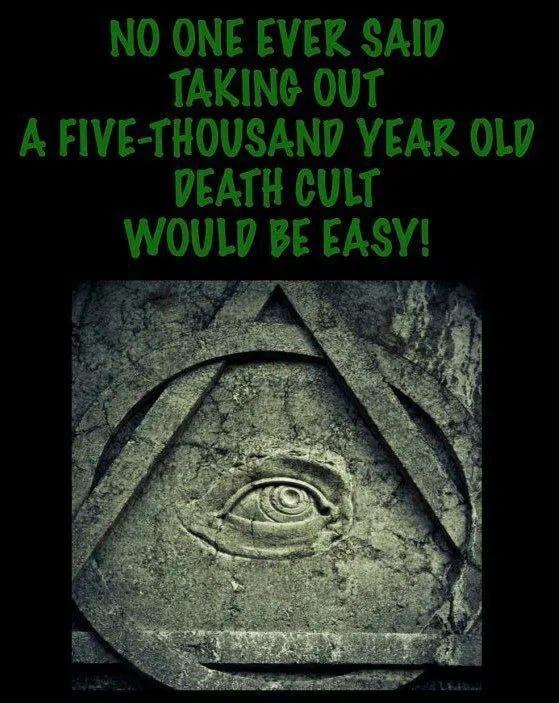




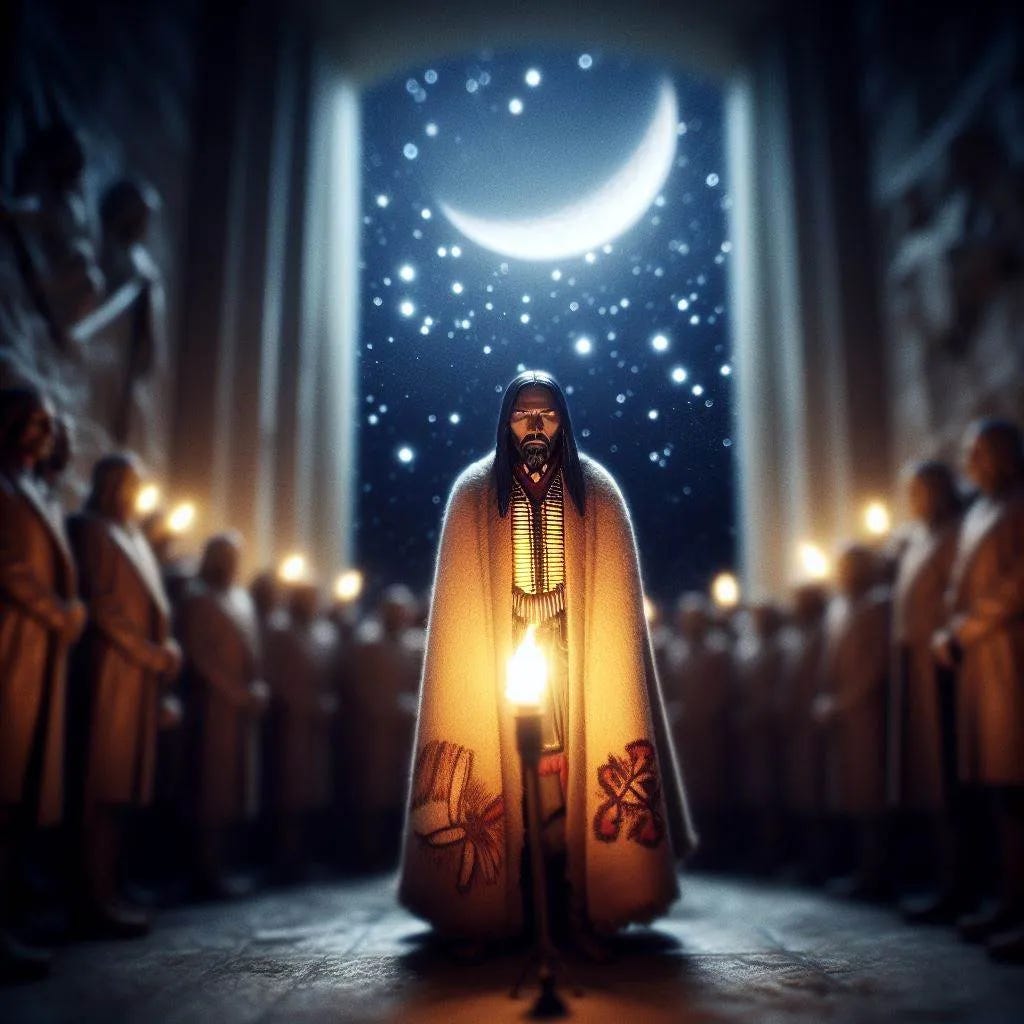






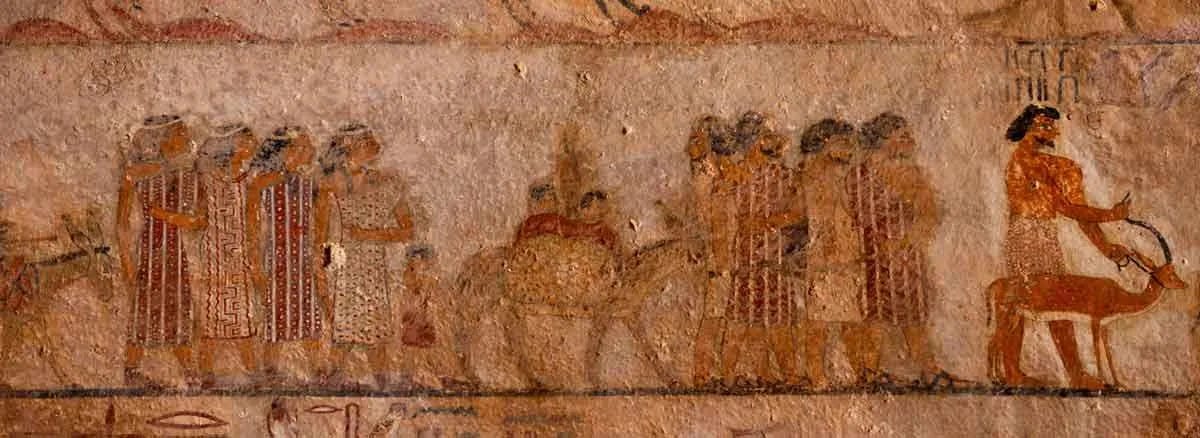
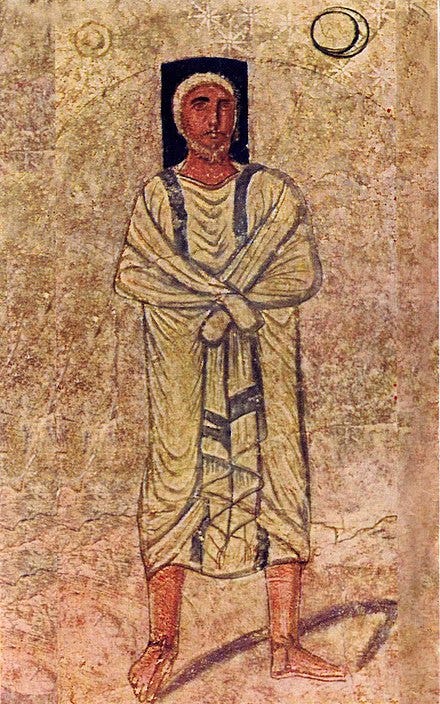
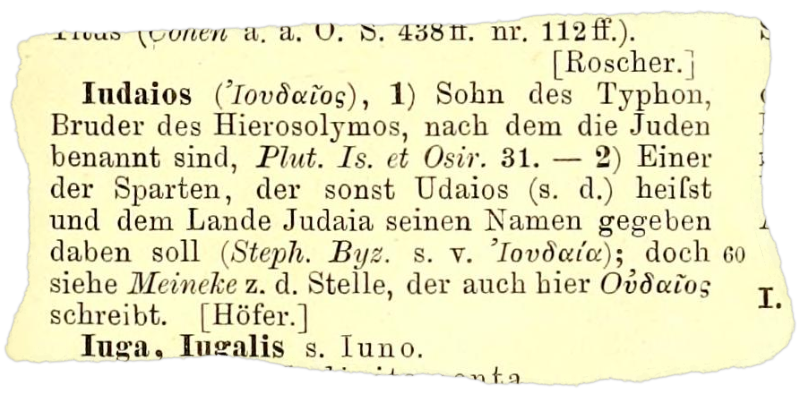









hola, tereza. again, very very interesting. and is there something in the air around us focused on dismantling the stories of jew and bible? (clif high has called it the age of hyper-novelty or, by old language, the great apocalypse when all the lies are revealed.) anyway, earlier tonight i listened to most of jasun's podcast with kevin barrett and his pretty detailed look at some other aspects of the fakery of the jewish 'experience' narrative. and some of the possible psy-op stuff around the story-making elements of the holocaust and the land of the jews as self made scapegoats to continue the jewish experience psy-op. fascinating stuff, really. the discussion included casual reference to the well established (well known?) role of the zionists in the assassination of jfk and 9/11. (new to me.) if curious: https://childrenofjob.substack.com/p/jobcast-24-a-primordial-persecution
i don't have enough knowledge to refute or confirm what was discussed and so that now becomes another rabbit warren to explore at some point. i'll see how synchronicities guide that search — and it seems between you and jasun, that is starting to get deeper.
as you know i too like etymology and the canaan baal etymology of cannibal raised my eyebrows. and, of course, i checked that out by looking at some other dictionaries and their etymological references. not canaan baal, of course. one of the question marks the 'official' etymology raises is that their sources point to the first usage of cannibal' quite late, 1541 per webster. so.... has this word history been jigged to suit its etymology being 'from Spanish Caníbal, from Taino Caniba,' to keep it away from canaan baal? i confess to 'liking' the canaan baal root, although now i simply don't know and won't take the time to research for earlier usages of something akin to canaan baal before 1541.
and thank you for highlighting that 'religious' narcissistic gaslighting very clearly predates my idea that the roman catholic narrative was likewise narcissistic gaslighting, ie the creation of a false and highly controlled narrative that must be believed in order to be welcomed to the group. religion is, it seems, a rather clever spelling of 'being tied to the ruler'. wow! jung with his deep knowledge of language cites religion as being 're-ligio' tied back. however the official etymologies have a peculiar flavour to them about being studious and re-re-reading repeatedly. however, when i dug down through the links in wiktionary, for example, the etymology does get back to jung's etymology:
Etymology 2
From Proto-Indo-European *leyǵ- (“to bind”).[1]
jung took that as grounding people to the earth. now i wonder, if what was meant was to bind people to narcissistic gaslighting lies.
so much to think about and consider. fascinating stuff. i'm still digesting this. i was at best a very marginal bible dabbler. gracias.
The pictures of the five African women remind me of a quote. During "negotiations" Gamal Abdel Nasser was asked if he trusted the Israelis. His answer?
"They left here (Egypt) as black, and they returned (to the M.E.) as white..........., so, no, I don't trust them.
I wrote "negotiations" because the Israeli government never negotiate in good faith.